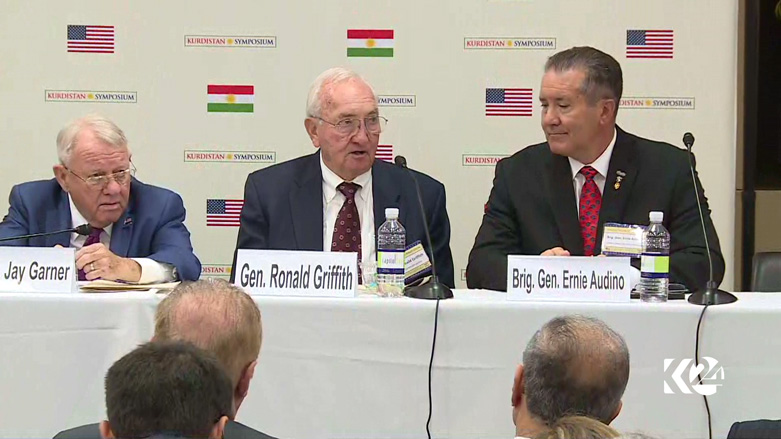Independent Kurdistan would be strategic US ally, retired Generals say

WASHINGTON DC, United States (Kurdistan 24) – A panel of retired US general officers took the stage on Friday to explain their support for the forthcoming referendum on Kurdish independence.
The group opened a Capitol Hill symposium on July 28, sponsored jointly by Kurdistan 24 and The Washington Times and entitled, “The Kurdistan Region: A Strategic US Ally in a Tough Neighborhood.”
“I don’t think our leadership realizes the absolute strategic significance of Iraqi Kurdistan.,” Lt. Gen. Jay Garner, task force commander for Operation Provide Comfort in 1991, and then head of the Office of Reconstruction and Humanitarian Assistance (ORHA) in Iraq in the spring of 2003, said.
Along with the other panelists, Garner proceeded to make three crucial points. First, Iraq is broken beyond repair. Secondly, Baghdad is no longer a US ally; it is dominated by Iran. And, thirdly, the Kurdistan Region is a US ally.
All the panelists strongly objected to the “one-Iraq” policy the US has pursued for decades. As Garner put it, “Sykes-Picot is dead, and we can’t bring it back.”
General Ronald Griffith, former Vice-Chief of Staff of the US Army, stated, “Iraq is no longer viable.”
Brig. Gen. Ernie Audino commanded a team of combat advisors embedded in a Peshmerga Brigade during Operation Iraqi Freedom. Audino said, “Iraq is collapsing of its own weight,” while the Kurds are “the cream rising to the top.”
Joe Reeder, a former Undersecretary of the Army, spoke from the audience, adding that he had “serious questions” as to whether Iraq can survive in its present form.
These former senior officials presaged what Masrour Barzani, Chancellor of the Kurdistan Region Security Council, would say later in the day when he characterized America’s continued adherence to a “one-Iraq” policy as “delusional.”
The panelists also agreed that Tehran had so much influence in Baghdad that the latter could no longer be considered a US ally. Garner said that there were over 100,000 “Iranian-led, Iranian trained, paramilitary Shiite units in Iraq.”
Griffith called on the US to “start to back away” from the “one-Iraq” policy. “We have spent billions of dollars” in Iraq, “trillions probably,” and “for the most part to no avail.”
"More importantly, however, we have lost over 4,000 American servicemen," he said.
We are supporting a government that “is getting its advice and support from the Iranians, while we pay the bill,” Griffith said.
Audino called the “one-Iraq” policy, the “functional Iranian annexation of the vast majority of Iraq.”
Rather than continue to cling to a failing policy, premised on Iraq’s continued unity, all three panelists called on Washington to embrace a strategic alliance with the Kurdistan Regional Government (KRG) including establishing a permanent military base there.
US officials generally agree that after the Islamic State (IS) is defeated, the US should maintain some military presence in Iraq and not withdraw, as it did in 2012. But as Garner suggested, both the Shiites and Sunnis will “demand that the US leave.”
Michael Pregent, a retired military intelligence officer, who moderated the panel, noted that Nouri al-Maliki, formerly Iraqi Prime Minister and now a Vice-President in Iraq, was just in Moscow, where his focus had been how to get US forces to leave Iraq as quickly as possible.
An independent Kurdistan would welcome a US military presence. Garner suggested that the US should also station an anti-missile unit in Kurdistan, where it could engage Iranian missiles launched toward Europe or the US.
Griffith noted the importance of gaining buy-in from Turkey. Ankara has strong economic ties with the Kurdistan Region and the KRG, understanding Turkey’s importance, has worked hard over the years to maintain decent relations. Griffith suggested that US talks with Turkey on the issue should begin “right away.”
Editing by G.H. Renaud
